exam questions with answer ,class notes
EXCELLENT HOMEWORK HELP AND TUTORING ,ALL KIND OF QUIZ AND EXAMS WITH GUARANTEE OF A
Am an expert on major courses especially; psychology,Nursing, Human resource Management and Mathemtics Assisting students with quality work is my first priority. I ensure scholarly standards in my documents and that's why i'm one of the BEST GOLD RATED TUTORS in STUVIA. I assure a GOOD GRADE if you will use my work.
- 203
- 0
- 1
Community
- Followers
- Following
201 items
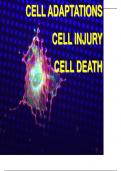
CELL ADAPTATIONS
CELL ADAPTATIONS CELL INJURY CELL DEATH OBJECTIVES Understand the 3 main anatomic concepts of disease---Degenerative, Inflammatory, Neoplastic Understand the concepts of cellular growth adaptations---Hyperplasia, Hypertrophy, Atrophy, Metaplasia Understand the factors of cell injury and death---O2, Physical, Chemical, Infection, Immunologic, Genetic, Nutritional OBJECTIVES Understand the pathologic mechanisms at the SUB-cellular level---ATP, Mitochondria, Ca++, ...
- Class notes
- • 66 pages •
CELL ADAPTATIONS CELL INJURY CELL DEATH OBJECTIVES Understand the 3 main anatomic concepts of disease---Degenerative, Inflammatory, Neoplastic Understand the concepts of cellular growth adaptations---Hyperplasia, Hypertrophy, Atrophy, Metaplasia Understand the factors of cell injury and death---O2, Physical, Chemical, Infection, Immunologic, Genetic, Nutritional OBJECTIVES Understand the pathologic mechanisms at the SUB-cellular level---ATP, Mitochondria, Ca++, ...

CELL PHYSIOLOGY
CELL PHYSIOLOGY A.N Malik Thursday, September 26, 2024 Overview Functional organization of the body A.N Malik 2 Levels of organization (cell to organism) Thursday, September 26, 2024 A.N Malik 3 Overview • Human physiology: study of the bodily functions of human beings • Cells: a cell is the fundamental functional unit of life in which physiological processes happen. This processes happen within the intracellular fluid(ICF). • Extracellular fluid (ECF)“in...
- Case
- • 127 pages •
CELL PHYSIOLOGY A.N Malik Thursday, September 26, 2024 Overview Functional organization of the body A.N Malik 2 Levels of organization (cell to organism) Thursday, September 26, 2024 A.N Malik 3 Overview • Human physiology: study of the bodily functions of human beings • Cells: a cell is the fundamental functional unit of life in which physiological processes happen. This processes happen within the intracellular fluid(ICF). • Extracellular fluid (ECF)“in...
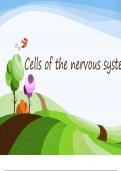
Cells of the nervous system
Cells of the nervous system Broadly categorized into: Neurons Neuroglial cells Neurons • A neuron is the basic structural and functional unit of the NS. • Clustered in: • Columns or layers • Nuclei • Dispersed within gray matter • Regardless of location, all central neurons share the general features (ganglionic neurons have some unique features) A.N Malik, Department of Human Anatomy, JKUAT 3 9/26/2024 General structure of a neuron A.N Malik, Departm...
- Class notes
- • 19 pages •
Cells of the nervous system Broadly categorized into: Neurons Neuroglial cells Neurons • A neuron is the basic structural and functional unit of the NS. • Clustered in: • Columns or layers • Nuclei • Dispersed within gray matter • Regardless of location, all central neurons share the general features (ganglionic neurons have some unique features) A.N Malik, Department of Human Anatomy, JKUAT 3 9/26/2024 General structure of a neuron A.N Malik, Departm...

EPIDEMIOLOGY
EPIDEMIOLOGY + Epidemiology is the study of the distribution and determinants of health related states or events (including disease), and the application of this study to the control of diseases and other health problems. - WHO + Epidemiology noun ep·i·de·mi·ol·o·gy ˌe-pə-ˌdē-mē-ˈä-lə-jē, ˌde-mē- medical : the study of how disease spreads and can be controlled.- Merriam-Webster Dictionary + The Chain of Infection Infection can only s...
- Class notes
- • 36 pages •
EPIDEMIOLOGY + Epidemiology is the study of the distribution and determinants of health related states or events (including disease), and the application of this study to the control of diseases and other health problems. - WHO + Epidemiology noun ep·i·de·mi·ol·o·gy ˌe-pə-ˌdē-mē-ˈä-lə-jē, ˌde-mē- medical : the study of how disease spreads and can be controlled.- Merriam-Webster Dictionary + The Chain of Infection Infection can only s...

DYNAMICS OF DISEASE TRANSMISSION
DYNAMICS OF DISEASE TRANSMISSION 2 1st - The Infectious Agent-any disease-causing microorganism (pathogen) Infectivity Pathogenicity 3 Virulence 2nd: Source or Reservoir • The starting point for the occurrence of a communicable disease • Source of infection : • the person, animal, object or substance from which an infectious agent passes or is disseminated to the host (immediate source) • RESERVOIR: • “any person, animal, arthropod, plant, soil, ...
- Class notes
- • 59 pages •
DYNAMICS OF DISEASE TRANSMISSION 2 1st - The Infectious Agent-any disease-causing microorganism (pathogen) Infectivity Pathogenicity 3 Virulence 2nd: Source or Reservoir • The starting point for the occurrence of a communicable disease • Source of infection : • the person, animal, object or substance from which an infectious agent passes or is disseminated to the host (immediate source) • RESERVOIR: • “any person, animal, arthropod, plant, soil, ...
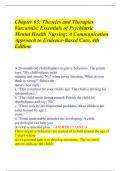
Chapter 03: Theories and Therapies Varcarolis: Essentials of Psychiatric Mental Health Nursing: A Communication Approach to Evidence-Based Care, 4th Edition
Chapter 03: Theories and Therapies Varcarolis: Essentials of Psychiatric Mental Health Nursing: A Communication Approach to Evidence-Based Care, 4th Edition A 26-month-old child displays negative behaviors. The parent says, "My child refuses toilet training and shouts, 'No!' when given direction. What do you think is wrong?" Select the nurse's best reply. a. "This is normal for your child's age. The child is striving for independence." ...
- Exam (elaborations)
- • 18 pages •
Chapter 03: Theories and Therapies Varcarolis: Essentials of Psychiatric Mental Health Nursing: A Communication Approach to Evidence-Based Care, 4th Edition A 26-month-old child displays negative behaviors. The parent says, "My child refuses toilet training and shouts, 'No!' when given direction. What do you think is wrong?" Select the nurse's best reply. a. "This is normal for your child's age. The child is striving for independence." ...
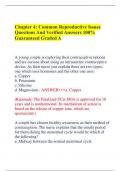
Chapter 4: Common Reproductive Issues Questions And Verified Answers 100% Guaranteed Graded A
Chapter 4: Common Reproductive Issues Questions And Verified Answers 100% Guaranteed Graded A A young couple is exploring their contraceptive options and are curious about using an intrauterine contraceptive device. As their nurse you explain there are two types, one which uses hormones and the other one uses: a. Copper b. Potassium c. Silicone d. Magnesium - ANSWER>>>a. Copper (Rationale: The ParaGard-TCu-380A is approved for 10 years and is nonhorm...
- Class notes
- • 17 pages •
Chapter 4: Common Reproductive Issues Questions And Verified Answers 100% Guaranteed Graded A A young couple is exploring their contraceptive options and are curious about using an intrauterine contraceptive device. As their nurse you explain there are two types, one which uses hormones and the other one uses: a. Copper b. Potassium c. Silicone d. Magnesium - ANSWER>>>a. Copper (Rationale: The ParaGard-TCu-380A is approved for 10 years and is nonhorm...
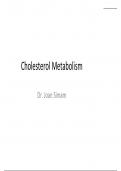
Cholesterol Metabolism
Cholesterol Metabolism
- Class notes
- • 30 pages •
Cholesterol Metabolism

Chronic inflammation
Chronic inflammation This is an inflammatory cellular response that may have an immunological basis attended by fibroblastic reaction. Considered to be of prolonged duration. (months to years) and commonly follows acute inflammation but may start by it self especially when causative organisms are of low grade virulence or the basis of the injury is an antigen-antibody reaction e.g Rheumatic fever & rheumatoid arthritis. Characterised by: 1) Continued active inflamm...
- Class notes
- • 21 pages •
Chronic inflammation This is an inflammatory cellular response that may have an immunological basis attended by fibroblastic reaction. Considered to be of prolonged duration. (months to years) and commonly follows acute inflammation but may start by it self especially when causative organisms are of low grade virulence or the basis of the injury is an antigen-antibody reaction e.g Rheumatic fever & rheumatoid arthritis. Characterised by: 1) Continued active inflamm...

Classification of Diseases
Diseases can be classified in different ways. The broad classification is: Infectious diseases: Can be spread from one host to another. II. Non-infectious diseases: Cannot be spread. The above classification is to do with the tendency to spread. There are numerous modes of spread that include: 1. Through contact. 2. Inhalation 3. Exchange of body fluids (blood, mucous, semen, vaginal secretions, saliva, pus and joint aspirates) 4. Through eating infected fo...
- Class notes
- • 7 pages •
Diseases can be classified in different ways. The broad classification is: Infectious diseases: Can be spread from one host to another. II. Non-infectious diseases: Cannot be spread. The above classification is to do with the tendency to spread. There are numerous modes of spread that include: 1. Through contact. 2. Inhalation 3. Exchange of body fluids (blood, mucous, semen, vaginal secretions, saliva, pus and joint aspirates) 4. Through eating infected fo...
